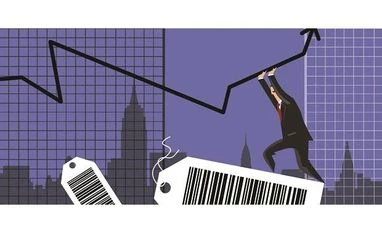By Lewis Krauskopf
NEW YORK (Reuters) - Earnings reports from major retailers will be in focus next week after the U.S. stock market suffered one of its biggest pullbacks in months, with investors looking for clues on the pace of inflation and consumer spending and whether companies can sustain their strong earnings momentum.
The S&P 500 fell 4% from Monday through Wednesday, the biggest three-day swoon for the benchmark index since late October, after several months of largely calm and steady increases to record highs, although it partially rebounded at the end of the week.
Investors are zeroing in on inflationary concerns as the potential spark for greater turbulence after data showed consumer prices rose in April by the most in about 12 years. On the heels of a surprisingly weak jobs report, the retailers' reports will offer the latest insight on how the economy is faring as businesses rebound from the coronavirus pandemic.
"There's a few more worries for investors today than there were a couple weeks ago," said James Ragan, director of wealth management research at D.A. Davidson.
Stocks rebounded somewhat on Thursday and Friday, putting the S&P 500's gain for the year at more than 10%. The Cboe Volatility Index - known as Wall Street's fear gauge - moved lower but was still above most of the past month's levels.
Also Read
Data on Friday showed U.S. retail sales unexpectedly stalled in April, shifting the focus to companies for their views on the state of consumer spending.
Walmart Inc, the world's biggest retailer, is set to release quarterly results on Tuesday. Reports from big box retailer Target Corp and home improvement companies Home Depot Inc and Lowe's Cos Inc - which are the three largest companies by market value in the S&P 500 retailing index after Amazon - are also due next week.
Other retailers set to report include Ralph Lauren, TJX Cos and L Brands, owner of Victoria's Secret and Bath & Body Works.
Inflation concerns will be at the forefront. Higher inflation could crimp consumer demand and company profit margins or force the Federal Reserve to tighten monetary policy.
Following data this week showing sharp increases for consumer and producer prices, retailers could face questions on whether sticker shock is putting off shoppers, how they are handling higher costs and whether they are raising wages for their employees.
"It will be interesting to see one, how much they are able to pass the costs along, and two, are these higher costs starting to impact demand?" said Jack Ablin, chief investment officer at Cresset Capital Management. "Nothing that I have seen suggests they are, but perhaps something that maybe a Home Depot or Lowe's says may change that view."
With the United States loosening coronavirus restrictions, investors will want to see signs of an economic rebound reflected in the reports, including whether stimulus checks sent by the federal government to Americans are boosting sales.
"I would look for confirmation that the stronger mobility and economic activity that we saw in the first quarter actually translated into spending for some of these retail companies," said Anthony Saglimbene, global market strategist at Ameriprise Financial. "The outlooks from these companies should be fairly positive." (Graphic: Key U.S. retail share performance in 2021, https://graphics.reuters.com/USA-STOCKS/RETAIL/qmyvmebazvr/chart.png)
So far, first-quarter earnings have supported the historically expensive valuations for stocks, which have incorporated expectations of an economic recovery this year.
With over 90% of S&P 500 companies having reported, overall earnings are expected to have climbed 50.6% from a year ago, according to Refinitiv IBES. The consumer discretionary sector, which includes many retailers, is seeing profits jump 191.3%, the biggest rise of any sector.
Walmart, which is part of the consumer staples sector, saw its revenue soar to $560 billion in its latest fiscal year as people stocked up on groceries during the pandemic. Analysts expect the company to post a 2.2% rise in earnings for its latest quarter, according to Refinitiv.
Home Depot and Lowe's are both expected to see their quarterly earnings jump by about 45% from a year ago, as investors look for updates from the companies on the state of the housing market and the impact of higher lumber prices.
"The market is really pricing in companies beating estimates," Ragan said. "So if retailers are a little more cautious because of some inflationary pressures perhaps that they see out there, then that could derail the earnings growth story just a little bit."
(Reporting by Lewis Krauskopf; Editing by Megan Davies and Dan Grebler)
(Only the headline and picture of this report may have been reworked by the Business Standard staff; the rest of the content is auto-generated from a syndicated feed.)
)